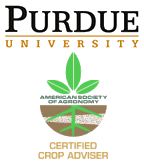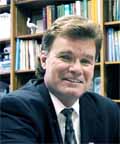
Proceedings 2008
Indiana Certified Crop Adviser Conference
Production Ag-Meeting Future Demands for Food, Fiber and Fuel
Future food, fiber, fuel, and water requirements of a growing global population will place increasing stresses on fragile ecosystems. While all ecosystems are impacted by human intervention and management, meeting future global demands for food and other resources will challenge societies to cooperatively manage and protect agro-ecosystems. To sustain a growing global population the US must respond to increasing national and global pressures on a relatively fragile agro-ecosystem. This discussion will focus on the primary drivers that have and will continue to change U.S. agriculture. These include 1) increasing world population, 2) increasing conversion of farmland to non-agricultural uses, 3) increasing reliance on the U.S. for world food aid, 4) increasing use of food crops for non-food uses, and 5) continued degradation of world soil productivity.
 John Havlin Professor in the Department of Soil Science and Coordinator for Distance Education Programs in the College of Agriculture and Life Sciences
John Havlin Professor in the Department of Soil Science and Coordinator for Distance Education Programs in the College of Agriculture and Life Sciences
North Carolina State University
john_havlin@ncsu.edu
John Havlin is Professor (former Department Head) in the Department of Soil Science and Coordinator for Distance Education Programs in the College of Agriculture and Life Sciences at North Carolina State University. He received his B.S. in Chemistry from Illinois State University and his M.S. and Ph.D. in Soil Chemistry from Colorado State University. His area of expertise is in soil fertility/chemistry, soil management, remote sensing, and viticulture. Prior to NC State University, he was a Professor at Kansas State University (1986-96) and the University of Nebraska (1983-85). He is Fellow in Soil Science Society of America, American Society of Agronomy, and the National Association of College Teachers in Agriculture. He served on numerous state, regional, and national committees and advisory boards related to nutrient management, natural resources, sustainable agriculture, and environmental quality. He served as President of the Soil Science Society of America (2005). He has developed nationally recognized extension education programs in dryland cropping systems, precision agriculture, and nutrient management, and is providing leadership in developing internet-based soil science curriculum. He has received numerous research, teaching, and extension awards, and is a recipient of the USDA Honor Award (2004). Authored/co-authored 167+ refereed and other technical papers, eight book chapters, and is the author of the internationally recognized textbook Soil Fertility and Fertilizers.